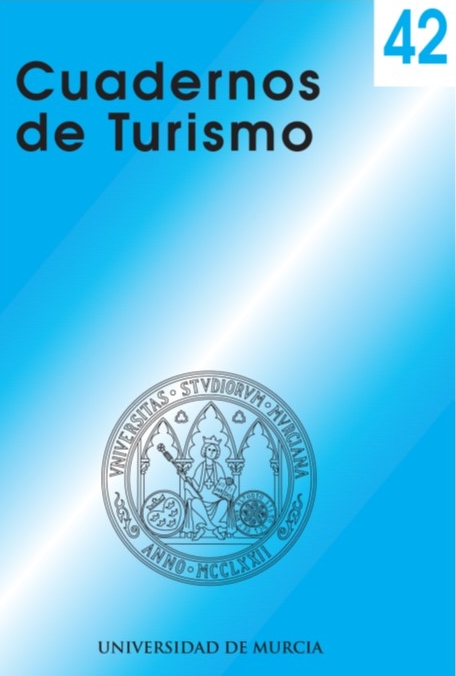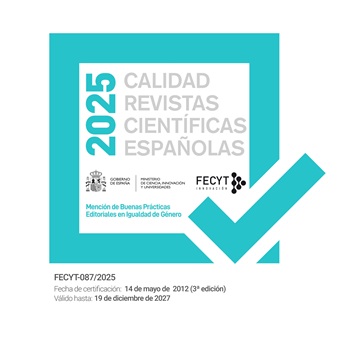About the opportunity of the tourist taxes: the case of Seville
Abstract
The aim of this paper is to present the different viewpoints on the existing debate over tourism taxes in Spain and Europe; with a special focus on Seville, for its application. Tourism taxation itself is broader than it seems and it’s correlated with an effort to raise income for extra marketing promotion; especially in saturated tourism destinations, which usually suffer from environmental problems due to excessive offer. Surely, the most used tourism tax tool is the hotel overnight rate; however, paradoxically, in recent years, this income has been used in matters different than tourism. The application of this overnight stay tax for tourists (it would be unlikely for visitors or day excursionist pay this tax), has been the improvement of public roads, water facilities, and urban landscape to optimize the destination Tourist or the residents, who undergo the tourist impact in excess. It is, in detail, the open debate and still without crystallizing, on the case of Seville. The council has initiated the proposal on the rate, and the Autonomous Community that is the competent, has rejected it. In the course of events it is observed that hoteliers are the highest opponents of the rate; In a context that should not be forgotten about the extraordinary diffusion of the tourist apartments, both alegals and properly illegal. It will be seen in the text through qualified interviews, the position of the different actors, and we provid the data for 2008- 2015, and the successes and challenges from 2016: the historic year of tourism in Seville.
Downloads
-
Abstract2051
-
PDF (Español (España))1889
-
PDF1889
References
ABEYRATNE, I. (1993): «Air transport tax and its consequences on tourism», Annals of Tourism Research, vol. 20 (3), 450-460.
AGUILÓ, E., RIERA, A. y ROSELLÓ, J. (2005): «The short-term price effect of a tourist tax through a dynamic demand model: The case of the Balearic Islands», Tourism Management , vol. 26 (3). 359-365.
ADAME MARTÍNEZ, F. (2013): «Turismo y financiación municipal: estudio sobre posibles nuevos Tributos Locales vinculados al turismo», Tributos Locales, nº 112, 13-61.
AMER FERNÁNDEZ, J. (2003): «Empresariado hotelero e implementación de un impuesto turístico: el caso de la ecotasa» en Baleares», Cuadernos de Turismo, nº 12, 165-178.
ASHWORTH, G. y PAGE, S.J (2011): «Urban tourism research: Recent progress and current paradoxes», Tourism Management, vol. 32 (1), 1-15.
AYUNTAMIENTO DE SEVILLA (2015): Balance anual de 2008-2015 del Turismo de Sevilla. Indicadores Turísticos de la Ciudad de Sevilla. Consorcio de Turismo de Sevilla.
AYUNTAMIENTO DE SEVILLA (2017): Turismo de Sevilla. El Sistema de Información Turística de la ciudad de Sevilla, febrero 2017. Consorcio de Turismo de Sevilla.
BIRD, R. (1992): «Taxing Tourism in Developing Countries», World Development, nº 20, 1145-1158.
BOKOBO, S. (1999): «La fiscalidad de las prestaciones turísticas. La posibilidad de que las Comunidades Autónomas establezcan la tasa turística», Civitas. Revista Española de Derecho Financiero, vol. 102, 243-260.
BONHAM, C., FUJII, E., IM, E., y MAK, J. (1991): «The impact of hotel room tax: An uninterrupted time series approach», National Tax Journal, vol. 45 (2), 433-441.
BOUAZZA, O. (2001): «La ecotasa balear: un ejemplo de situación de necesidad a la que nunca debió llegarse», Estudios Geográficos, nº 245, 737-744.
CANALIS, X. (2014): Túnez implanta una tasa turística. Hosteltur. Disponible en: http://www.hosteltur.com/174630_tunez-implanta-tasa-turistica-13-euros.html
CANTALLOPS, A.S. (2004): «Policies supporting sustainable tourism development in the Balearic Islands: The Ecotax», Anatolia, vol. 15 (1), 39-56.
CROTTS, J.C. y MCGILL, G.A. (1994): «Compliance with Local Option Lodging Taxes: Theory and Measurement Strategies», Journal of Travel and Tourism Marketing, Vol. 3, 51-83.
DALEY, M (2017): Options for a tourism levy for London. London Finance Commission. Working Paper 83.
GLAECONOMIC. London.
DECRETO 161/2013, de 30 de abril, por el que se aprueba el Reglamento del Fondo para el fomento del turismo. Diario Oficial de la Generalidad de Cataluña, de 3 de mayo de 2013, núm. 6368, 1-5.
DECRETO 28/2016, de 2 de febrero, de las viviendas con fines turísticos y de modificación del Decreto 194/2010, de 20 de abril, de establecimientos de apartamentos turísticos. Boletín Oficial de la Junta de Andalucía, de 11 de febrero de 2016, núm. 28, pp. 66-74.
DOPAZO, P. (2001): «Los tributos de carácter parafiscal: la nueva ecotasa balear», Derecho y Medio Ambiente, Revista Jurídica para el Desarrollo Sostenible, nº 7, 9-30.
DURBARRY, R. y SINCLAIR, M.T. (2001): Tourism Taxation in the UK, Report for the Tourism Action Group, Confederation of British Industry.
ETOA (2016): Policy/Regulation and taxation/Tourist taxes. European Tour Operators Association (ETOA). Londres. Disponible en: http://www.etoa.org/policy/regulation-and-taxation
EXCELTUR. (2015): Alojamiento turístico en viviendas de alquiler. Ernst & Young. Tourism & Law abogados, pp.104.
EXCELTUR. (2017): UrbanTUR 2016. Monitor de Competitividad Turística de Ciudades. Disponible: http://www.exceltur.org/wp-content/uploads/2017/05/URBANTUR-2016-240516-documento.pdf
FISH, M. (1982): «Taxing international tourism in West Africa», Annals of Tourism Research, vol. 9 (1), 91-103.
FONT, X. (2012): «El finançament del turisme als municipis i la taxa turística a Catalunya». P3T, Journal of Public Policies and Territories, vol. 1 (3), pp. 30-38.
FRANCO, J.F. (1996): «Posibles repercusiones para España de la implantación de la ecotasa». Economía Industrial, nº 310, 13-18.
FUJII, E., KHALED, M. y MAK, J. (1985): «The Exportability of Hotel Occupancy and Other Tourist Taxes», National Tax Journal, Vol. 38 (2), 169-177.
GAGO, A. y LABANDEIRA, X. (2001): «Turismo y fiscalidad ambiental: análisis comparado del impuesto eco-turístico balear», VIII Encuentro de Economía Pública: Cáceres, febrero de 2001.
GAGO, A. Y LABANDEIRA, X., PICOS, F. y RODRÍGUEZ, M. (2009): «Specific and general taxation of tourism activities. Evidence from Spain», Tourism Management, vol. 30 (3), 381-392.
GARCÍA ARANDA, E. (2004): «La Imposición sobre el Turismo en España: Principio y Fin de la Ecotasa Balear», Revista Aranzadi de Derecho Ambiental. Univ. Rey Juan Carlos, Madrid, España.
GARROD, B. (2004): Tourism management: managing for change, by Stephen J. Page. Butterworth-Heinemann, Oxford, 2003. 381 pp.
GOOROOCHURN, N. y SINCLAIR, M. (2005): «Economics of tourism taxation. Evidence from Mauritius», Annals of Tourism Research, vol. 32 (2), 478-498.
GOOROOCHURN, N. (2009): «Optimal commodity taxation in the presence of tourists», International Economic Journal, vol. 23, 197-209.
GUNN, C.A. (2002): Tourism planning: basis concepts cases. Routledge. London.
HALL, M. (2008): Tourism Planning: Policies, Processes & Relationships. Pearson, Prentice Hall. London. 1ª edición, 2000.
HIEMSTRA, S. e ISMAIL, J.A. (1992): «Analysis of Room Taxes Levied on the Lodging Industry», Journal of Travel Research, vol. 31 (1), 42-49.
HIEMSTRA, S. e ISMAIL, J.A. (2001): «Research Note to Incidence of the Impacts of Room Taxes on the Lodging Industry», Revision to Article Published in Spring 1993 Issue of HR. Journal of Travel Research, vol. 39, 319-320.
HOSTELTUR (2016): Cataluña recauda 43,5 M € por la tasa turística. Hosteltur. Disponible en: http://www.hosteltur.com/115924_cataluna-recauda-435-m-tasa-turistica.html
HUGHES, H. (1981): «A tourism tax the cases for and against», International Journal of Tourism Management, nº 2, 196-206.
IHALANAYAKE, R. (2007): Economics of tourism taxation: A study of tourism taxes in Australia. School of Applied Economics. Faculty of Business and Law Victoria University Melbourne, Australia. 381 pp. Disponible en: http://vuir.vu.edu.au/15608/1/Ihalanayake_2007compressed.pdf
INE (2016): Encuesta de ocupación de apartamentos turísticos. E.O.H. Encuesta de ocupación hotelera. E.O.A.T. Instituto Nacional de Estadística, Madrid.
JENSEN, T.C. y WANHILL, S. (2002): «Tourism’s taxing times: value added tax in Europe and Denmark», Tourism Management, vol. 23 (1), 67-79.
KATO, A., KWAK, S. y MAK, J. (2010): «Using the Property Tax to Appropriate Gains from Tourism», Journal of Travel Research, vol. 50 (2). 144-153.
LASARTE, J. y ESEVERRI, E. (2001): Turismo y financiación autonómica y local: comentarios sobre la llamada “ecotasa” y otras alternativas de financiación. Granada: Comares.
LEY 58/2003, de 17 de diciembre, General Tributaria. Boletín Oficial del Estado, BOE de 18 de diciembre de 2003, núm.302, pp. 44987-45065.
LEY 5/2010, de 11 de Junio, de Autonomía Local de Andalucía. Boletín Oficial de la Junta de Andalucía, BOJA de 23 de junio de 2010, núm. 122, pp. 6-34.
LEY 5/2012, de 20 de marzo, de medidas fiscales, financieras y administrativas y de creación del Impuesto sobre las Estancias en Establecimientos Turísticos. Diario Oficial de la Generalidad de Cataluña, de 23 de marzo de 2012, núm. 6094, pp. 15369-15458. BOE núm. 83 de 06 de Abril de 2012, pp. 27915-28021
LEY 2/2016, de 30 de marzo, del impuesto sobre estancias turísticas en las Islas Baleares y de medidas de impulso del turismo sostenible. Boletín Oficial de las Islas Baleares, de 2 de abril de 2016, núm. 42, pp. 9110-9121.
MAK, J. y NISHIMURA, E. (1979): «The Economics of a Hotel Room Tax», Journal of Travel Research, nº17, 2-6.
MAK, J. (1988): «Taxing Hotel Room Rentals in the US», Journal of Travel Research, vol. 21, 10-15.
MERCADO, I. (2003): «¿Hacia un cambio de modelo turístico?: reflexiones a partir de la ecotasa», Revista de Fomento Social, vol. 58 (231), 469-500.
OMT (1998): Tourism taxation: Striking a fair deal. World Tourism Organization, Madrid (1998).
OMT (2017): Panorama OMT del turismo internacional. Edición 2016. España: OMT.
PAGE, S.J. (2009): Tourism management: managing for change. Butterworth Heinemann. Oxford.
PALMER, T. y RIERA, A. (2003): «Tourism and environmental taxes», Tourism Management, vol. 24, 665-674.
PALMER, T., RIERA, A. y ROSELLÓ, J. (2007): «Taxing tourism: The case of rental cars in Mallorca», Tourism Management, vol. 28 (1), 271-279.
PIGA, C. (2003): «Territorial planning and tourism development tax», Annals of Tourism Research, nº vol. 30 (4), 886-905.
PONJAN, P. y THIRAWA, N. (2016): «Impacts of Thailand’s tourism tax cut: A CGE analysis», Annals of Tourism Research, vol. 61, 45-62.
PRADOS, E. (2001): «Fiscalidad y turismo: el impuesto turístico», Quincena fiscal, nº 4, 11-19.
PUIG, I. (2007): «Fiscalidad y sostenibilidad en los destinos turísticos, Estudios Turísticos, nº 172-173, 181-185.
ROCA, J., PUIG, I. y HERCOWITZ, M. (2004): «La propuesta del impuesto turístico (Ecotasa) para Lanzarote», Revista de Estudios Regionales, nº 70, 203-221.
SAETA (2016): Datos básicos del turismo en Andalucía por provincias. Empresa Pública Turismo y Deporte de Andalucía (EPTA). Junta de Andalucía. Málaga.
SANTAMARTA, J. y CASTEJÓN, F. (2001): «La ecotasa de Baleares», Página Abierta, nº116, 12-17.
SHEN, L. y TSUI, Y. (2009): «Taxing tourism: enhancing or reducing welfare?», Journal of Sustainable Tourism, vol.17 (5), 627-635.
SIMANCAS, M. R. (2008): «El sistema de cobro de una tasa pública por la prestación de servicios turísticos en las áreas protegidas de Canarias», Cuadernos de Turismo, nº 21, 201-238.
SPENGER, J. y UYSAL, M. (1989): «Considerations in the hotel taxation process», Journal Hospitality Management, vol. 8 (4), 309-316.
Las obras que se publican en esta revista están sujetas a los siguientes términos:
1. El Servicio de Publicaciones de la Universidad de Murcia (la editorial) conserva los derechos patrimoniales (copyright) de las obras publicadas, y favorece y permite la reutilización de las mismas bajo la licencia de uso indicada en el punto 2.
2. Las obras se publican en la edición electrónica de la revista bajo una licencia Creative Commons Reconocimiento-NoComercial-SinObraDerivada 3.0 España (texto legal). Se pueden copiar, usar, difundir, transmitir y exponer públicamente, siempre que: i) se cite la autoría y la fuente original de su publicación (revista, editorial y URL de la obra); ii) no se usen para fines comerciales; iii) se mencione la existencia y especificaciones de esta licencia de uso.
3. Condiciones de auto-archivo. Se permite y se anima a los autores a difundir electrónicamente las versiones pre-print (versión antes de ser evaluada) y/o post-print (versión evaluada y aceptada para su publicación) de sus obras antes de su publicación, ya que favorece su circulación y difusión más temprana y con ello un posible aumento en su citación y alcance entre la comunidad académica. Color RoMEO: verde.





_.jpg)








